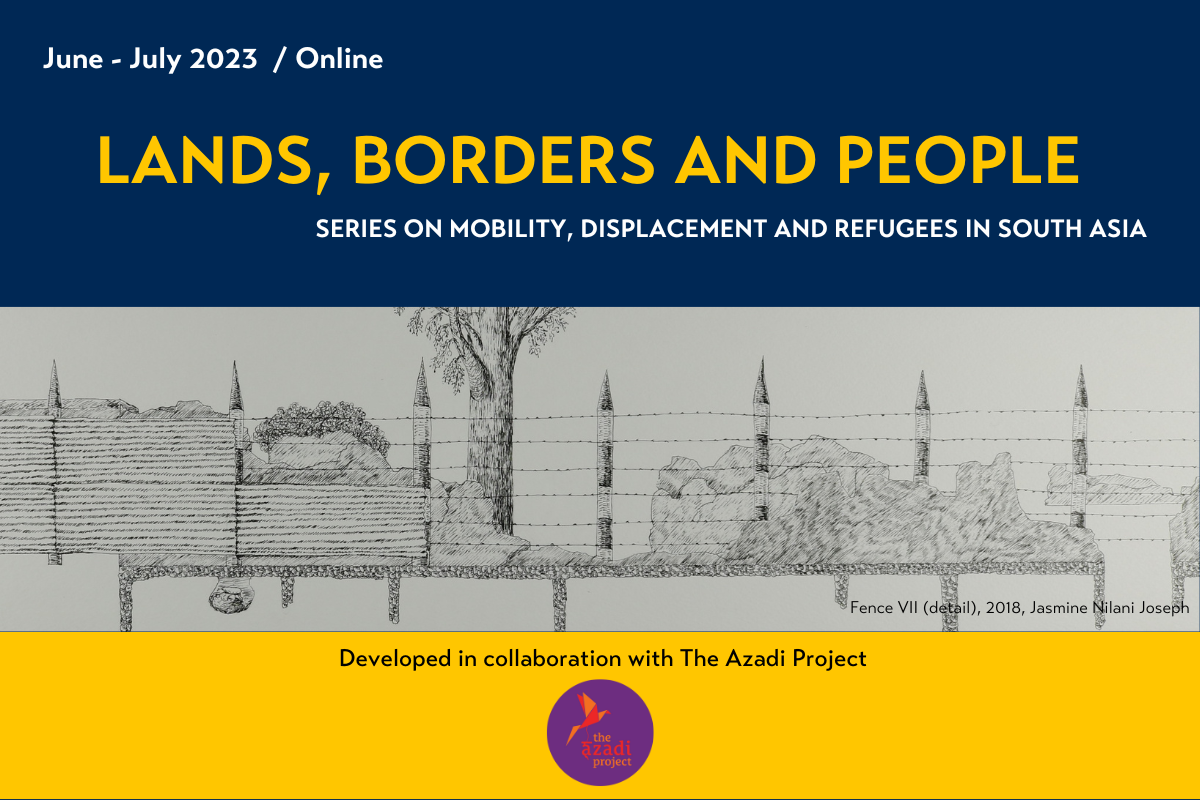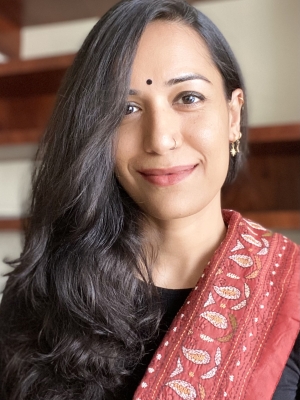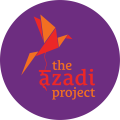Lands, Borders and People

The Lands, Borders and People, a four-part set of interactive learning modules that will take place over June and July 2023 will unpack an important and relevant contemporary issue that affects nations and communities across the world: migration, displacement and refugees. In each session, a panel of experts will examine aspects of this topic in detail, focusing on the legal, social, economic and cultural specificities of South Asia, with an engaged audience of stakeholders working in this sector - human rights activists, lawyers, journalists, NGOs, and others. This series is intended to create an open platform where we can raise awareness about and build an understanding of refugee issues in one of the largest regions affected by this human emergency in the world.
In 1950, the United Nations established the Office of the United Nations High Commissioner for Refugees (UNHCR) to offer protection and assistance to refugees worldwide. Originally intended to function for three years as a temporary office, it has since been extended every five years due to ongoing refugee situations across the world, owing to wars, political instability and increasingly, economic and climate crises.
The numbers are only going up. The UNHCR estimates that as of May 2022, over 100 million individuals have been displaced, owing to persecution, conflict, violence, or human rights violations. This massive number has meant an increasingly urgent policy response imperative for host states: integrating refugees into their economies and overseeing their welfare.
The imperative extends to South Asia too: whether with the Rohingya crisis in Myanmar or the number of Afghan refugees in Pakistan, Iran, and India - there are over 10 million refugees and internally displaced persons in the subcontinent. Despite the scale of this problem, basic livelihood questions remain unanswered. For instance, what are refugees' legal status in South Asia? How many are actually affected by climate-related disasters, and have had to move homes - whether in Bangladesh or other places? How well are refugees integrated into work, livelihood and economy, and how do we talk about refugees and what role does the media play?
To explore these complexities and promote a deeper understanding of this topic, Asia Society India Centre presents Lands, Borders and People: on Mobility, displacement and Refugees in South Asia.
FORMAT
Designed as a set of four learning modules, each session includes a panel discussion with experts and an open discussion with participants in a closed-door Zoom room.
Chapter 1: International Law and the Politics of Displacement
This introductory session will discuss the legal frameworks that guide governments across the world in how they respond to the protection of refugees. Taking a historical view of the topic, the panel of experts will unpack the 1951 Convention relating to the Status of Refugees and its 1967 Protocol, and present a critical analysis of how it operates today, especially in South Asia, and in the context of global discourse around the politics and policy of cross-border refugee and migrant crises. How does international law and policy affect the livelihoods of refugees in South Asia, and their rehabilitation and reintegration into the host society? Are there local laws that better suit developing countries? Is there a need to develop a regional refugee framework for South Asia?
Chapter 2: Climate-induced Migration and Displacement
Recognizing the newer and emerging forms of threat causing people to flee their homes and countries, this session will look at climate and weather-induced migration. According to the World Bank, the region of South Asia will witness 50 million climate refugees each year by 2050. The panel will discuss the key challenges in recognizing climate migrants as refugees and the organized efforts needed at the national and international levels. Can the United Nations' sustainable development goals be guiding principles to address climate migration? What are the climate disasters that are relevant to South Asia, and India, in particular?
Chapter 3: The Role Host Nations
This chapter looks at the social and economic challenges that affect host countries when dealing with mobility or forced migration. Are refugees a drain on the host economy or can they be rehabilitated to contribute to economic development and growth? What are the roles of the private and public sectors, respectively? How can native workers make space for refugees at work? This panel will attempt to move past prevailing rhetoric on 'migrant workers' to understand the economic challenges and opportunities to integrate refugees into the host economy.
Chapter 4: Media narratives on Displacement
To conclude the series, this panel will analyse the role of language and vocabulary in media and mass communication around the refugee 'crisis', globally and specifically in South Asia. Semantics about refugees often reflect, and shape, communities' attitudes towards them. What are the responsibilities of the media in reporting on refugee situations, how has reporting impacted policymaking and lived reality, and finally how can language and semantics become more inclusive and humane?
SERIES CHAIR AND MODERATOR

Priyali Sur is the Founder and the Executive Director of The Azadi Project. She has built and implemented programs across Europe, Africa and South Asia, helping refugees and migrants from Afghanistan, India, Iran, Iraq, Myanmar, Niger, Syria, Ukraine and Yemen. She was a former news anchor for CNN-IBN in India, and has consulted as a Social Development expert for the World Bank in Washington, D.C. Her work has been published in CNN, NPR, PBS, and The Guardian, among other international media outlets.
_______________________
SERIES COLLABORATOR

The Azadi Project
Winner of the Atlantic Council’s 2020 Distinguished Leadership Awards, The Azadi Project provides leadership skills and psychosocial support to women from some of the most conflict-affected regions and marginalized communities. Azadi has impacted the lives of more than 5,500 refugee women and its programs have benefitted displaced women from Afghanistan, Iran, Iraq, Myanmar, Niger, Syria, Ukraine and Yemen. Our program participants emerge as women leaders bringing positive change in their communities as well. We have implemented programs across the global south from Africa to the Middle East and in South Asia. Azadi’s team and advisors include experts with extensive knowledge of refugee rights, women's rights, and mental health issues
The artwork in the poster is by Jasmine Nilani Joseph, 2022 Asia Arts Future Honoree for Asia Society India